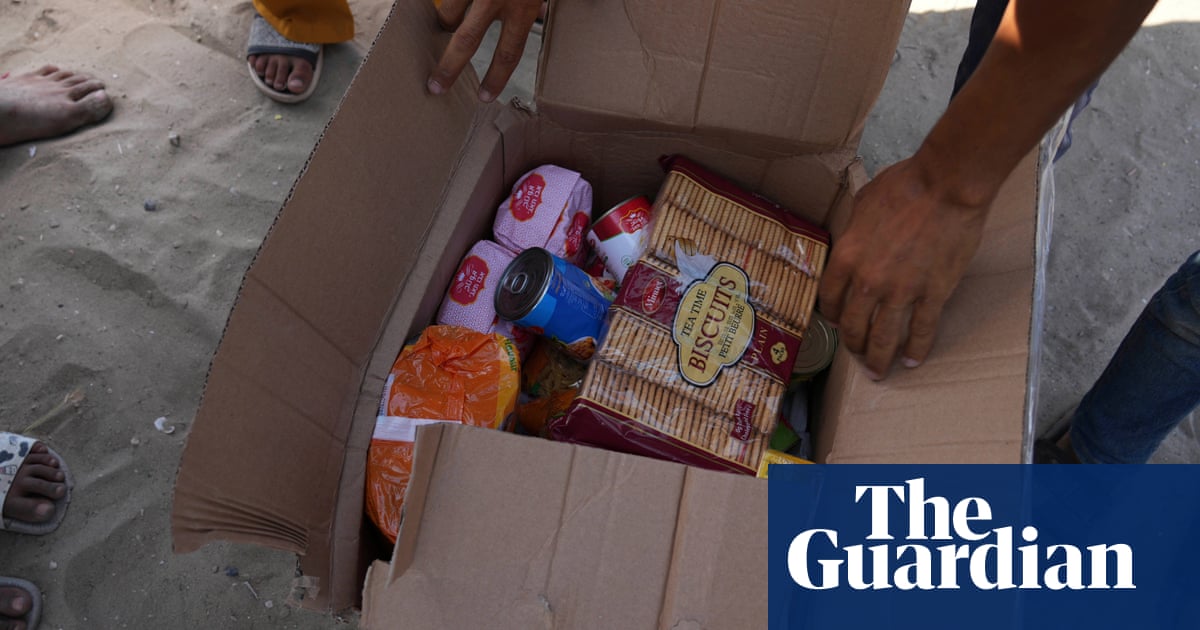After a rollout trumpeted by US officials, the US- and Israeli-backed effort that claimed it would return large-scale food deliveries toGazawas born an orphan, with questions growing over its leadership, sources of funding and ties to Israeli officials and private US security contractors.
The Gaza Humanitarian Foundation had said it wouldsecurely provide food supplies to the Gaza Strip, ending an Israeli blockade that UN officials say have led to the brink of a famine.
Instead, early reports and leaked video of its operations that began this week have depicted a scene of chaos, with crowds storming a distribution site and Israeli military officials confirming they had fired “warning shots” to restore order. Gaza health officials said at least one civilian had been killed and 48 injured in the incident.
In a statement, GHF downplayed the episode, claimed there had been no casualties, and said it had distributed 14,550 food boxes, or 840,262 meals, according to its own calculations.
But GHF had no experience distributing food in a famine zone, and as of Wednesday, its leadership remained opaque, if not deliberately obscure. A number of executives and board members have refuted links to the group or stepped down, including Jake Wood, the ex-Marine who previously headed the group. When he resigned on Sunday, he said that it “isnot possible to implement this plan while also strictly adhering to the humanitarian principles of humanity, neutrality, impartiality, and independence, which I will not abandon”.
Both a Geneva-based company and a Delaware-based company tied to the organisation are reportedly being dissolved, a GHF spokesperson told an investigative Israeli media outlet, increasing speculation over its initiators and sources of funding. The New York Times has reported that the idea for the group came from “Israeli officials in the earliest weeks of the war” as a way to undermine Hamas.
And the US state department has also distanced itself from GHF’s operations, with a spokesperson saying she could not speak to the group’s chaotic rollout or what plans could be made to extend aid to hundreds of thousands more people in Gaza who would not receive aid.
“This is not a state department effort. We don’t have a plan,” Tammy Bruce, the state department spokesperson, said during a briefing on Tuesday when asked about plans to extend aid deliveries to those in the north of the Gaza Strip. “I’m not going to speculate or to say what they should or should not do.”
She added that any questions about the group’s work should be addressed solely to the group.
“The Gaza Humanitarian Foundation has an email,” Bruce said. “You can – they should be reached out to, and that’s what I’d recommend regarding plans to expand, plans to make assessments of what’s worked and what hasn’t at this point and what changes they might make. And what the goal is – clearly the goal is to reach as many people as possible.”
But when contacted by the Guardian, the group said it couldn’t provide a representative for an interview and did not immediately respond to inquiries about its current leadership, where it was registered or its links to US security contractors.
The group did defend its food distribution, denying Palestinian crowds had been fired upon or that anyone had been injured at its distribution sites.
A statement sent to the Guardian from GHF said that under its protocol “for a brief moment the GHF team intentionally relaxed its security protocols to safeguard against crowd reactions to finally receiving food”.
The group in part blamed the “pressure” on the distribution site due to “acute hunger and Hamas-imposed blockades, which create dangerous conditions outside the gates”.
The statement did not address Israel’s role in preventing deliveries of aid.
“Unfortunately, there are many parties who wish to see GHF fail,” the group said.
The UN and other humanitarian organisations refused to work with GHF, arguing that doing so would compromise efforts to reaching civilians in all conflict zones, and put at risk both their teams and local people.
“Yesterday, we saw tens of thousands of desperate people under fire, storming a militarized distribution point established on the rubble of their homes,” said Jonathan Whittall, the head of the UN Office for the Coordination of Humanitarian Affairs in the Occupied Palestinian Territory.
Others have described the effort as an attempt to use deliveries of aid as a political weapon.
Kaja Kallas, the European Union’s top diplomat, said that the bloc opposed the “privatisation of the distribution of humanitarian aid. Humanitarian aid cannot be weaponized.”
